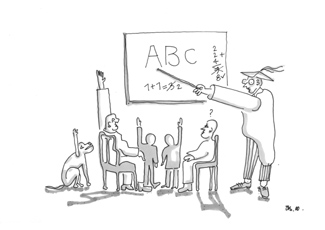|
|
|
|

Literacy in a thousand words
Literacy in a thousand words Literacy skills are a corner stone of economic success. The trouble is far too many people are without them.
by Beatriz Pont and Patrick Werquin, Education and Training Division; Directorate for Education, Employment, Labour and Social Affairs

The US economy may well be the world's largest, with the country riding a wave of unprecedented growth. Yet 40% of its adult population lack the literacy skills required to participate in today's complex knowledge economy. Likewise, other leading economies, such as Germany and the United Kingdom, show similar patterns. Should we be concerned?
Not too long ago, the answer might have been "no". In a more industrial-based economy, high-paying jobs in sectors such as automotive and manufacturing did not necessarily depend on high literacy levels. Also, there were plenty of job opportunities for the less qualified. But today, high literacy skills are vital, not just to get on, but to integrate into the economy in the first place.
According to one study, the International Adult Literacy Survey, workers not only must have higher levels of education, but the ability to adapt, learn and master new skills quickly and efficiently. Today's economy is knowledge based, and to participate in it requires increasingly complex skills. Policymakers have to respond to these changes in their strategies for designing general and adult education programmes.
The IALS defined literacy as "the ability to understand and employ printed information in daily activities, at home, at work and in the community." In other words, literacy is no longer just a question about being able to read, but is a more complex grouping of skills. The survey included a number of prose sections, such as texts from newspapers and brochures; an array of maps, schedules, charts and graphs to measure document literacy; and arithmetic operations to test basic quantitative literacy. These are the skills identified by experts as being necessary to survive and prosper in advanced industrialised countries.
Unfortunately, in many countries literacy levels are far from satisfactory. Of the 20 countries participating in the IALS study, the most striking are the results of the economic powerhouses, like the United States, Germany and Canada; while these countries have a large percentage of highly literate adults, there is an equally large percentage of the population that scores well below adequate. At the bottom of the ranking is Chile (less than 20% of its adult population performed adequately in all three skill areas), followed by Portugal, Poland and Slovenia.
The Nordic countries almost always rank highest in the three areas of literacy (prose, document and quantitative). Sweden has the highest overall scores, while Finland, Norway and Denmark vary according to the different literacy scales. Yet even in these countries at least a quarter of those surveyed didn't reach the minimum threshold. Still, the efforts placed on learning, and especially adult learning, in these countries to improve the situation of the people at the lowest literacy levels seem to have delivered good results. Not only do the Nordic countries have consistently high scores for literacy compared with other countries, their literacy levels tend to be more equally distributed among their populations: the differences between the least literate and the most literate are smaller than elsewhere.
Economic Sense
The links between economy and literacy are several and direct. High literacy skills are determinant of individual economic potential: higher employment participation, lower unemployment probabilities and higher skilled employment. They also condition the structure of the labour force as a whole. Countries with higher average levels of skills have larger proportions of knowledge workers (mobile, high-skilled). They are better prepared to contribute to technological developments as well as to adjust more effectively to them.
As far as the macro-economy is concerned, literacy and gross domestic product (GDP) go hand in hand. The higher the proportion of adults with high prose skills, the higher the GDP per capita. Furthermore, countries with wider economic inequality also have wider literacy inequality.
A number of noteworthy social benefits seem to be related to literacy skills. Literacy has been linked with better health and longer life expectancy; it could be that skilled people, through access to information and preventive health practices, can better manage their health needs. Other interesting findings show a relationship between literacy proficiency and the participation of women in government, as well as a link between literacy and public and civic participation.
Clearly all countries have work to do if they are to improve the literacy skills of their adult populations. They do not have much choice, given today's demanding economic realities. They can deploy tools, like lifelong learning and training programmes, and strengthen their assessment of results, rather than focusing too much on institutional processes. Concentrating on the educational level of younger people and on the least literate adults would help to improve the country's overall literacy level. Moreover, policymakers should be ready to evaluate informal learning too. That means assessing what people actually know, not just whether they have a diploma or not. From on-the-job experience and learning-by-doing, to reading and the internet: these are all useful types of learning whose value is too often overlooked. The effort required may be great, but the returns in terms of a more able, competitive economy, make it worth it. END
References
* OECD and Human resources development Canada, Literacy Skills for the Knowledge Society: Further Results from the International Adult Literacy Survey, Paris 1997
* OECD and statistics Canada (1995), Literacy, Economy and Society: Results of the First International Adult Literacy Survey, Paris and Ottawa, 1995
*OECD and statistics Canada (2000), Literacy in the Information Age: Final Report of the International Adult Literacy Survey, Paris and Ottawa, 2000